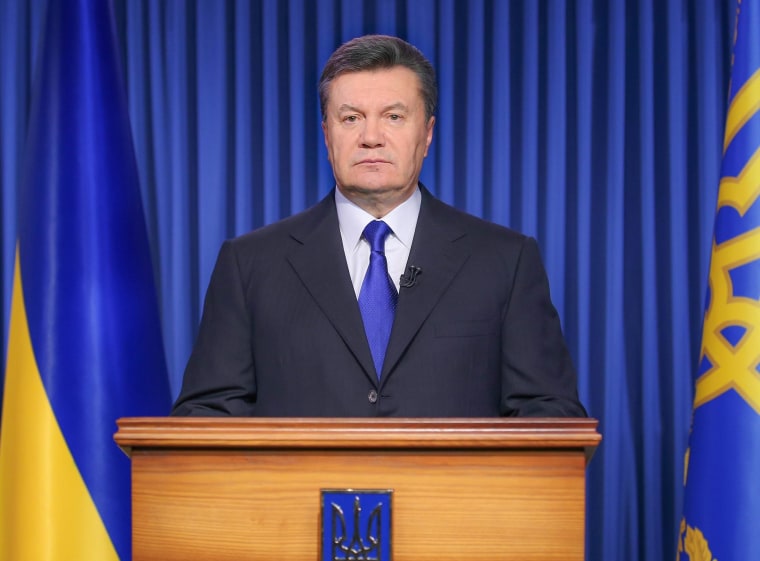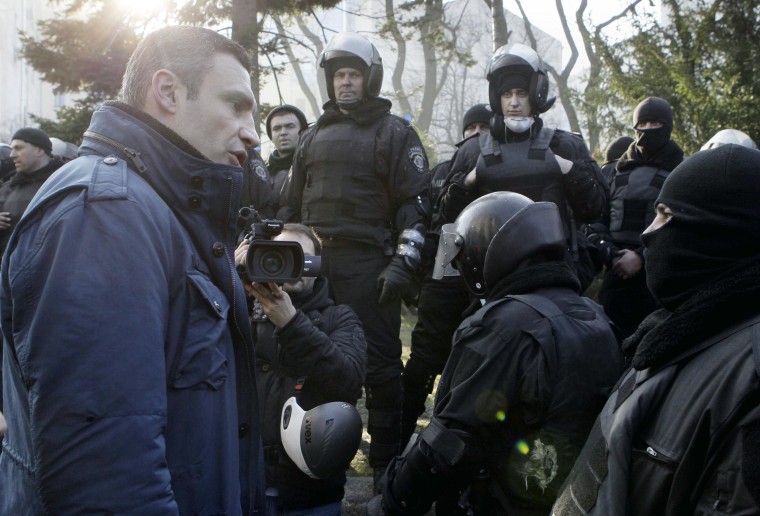The bloody collapse of a ceasefire between the Ukrainian government and the opposition has raised questions about who's in control of the protests in Kiev's Independence Square and who can stop the situation from descending into even more deadly chaos.
As NBC News' Richard Engel reported, it was front-line demonstrators who shattered a fragile truce just hours after it was announced late Wednesday into early Thursday by the leaders of three political parties who have been leading the anti-government movement since the fall.
“The three leaders who apparently accepted the ceasefire were not in control of that situation," Eugene Rumer of the Carnegie Endowment for International Peace said of armed protesters' surge forward, which sparked automatic gunfire from riot police.
While the crowds that have been flocking to the square include ordinary Ukrainians who say they don't identify with any party, there are concerns that right-wing militants are trying to hijack a grassroots campaign against the ruling Party of Regions and President Viktor Yanukovych.

“The young people who have turned up in the last month, the ones with the Molotov cocktails and the firearms, they are not controlled by the political parties. They are radicalized elements,” said Dominique Arel, chair of Ukrainian Studies at the University of Ottawa.
“The parties are not controlling the front-line activists. No one is controlling them.”
The official opposition is divided into three camps:
- The Ukrainian Democratic Alliance for Reform (UDAR, which translates to "Punch"), headed by former heavyweight boxing champion Vitali Klitschko. The 6-foot-7 pugilist, who has a Ph.D but little government experience, may be the most popular man in the country right now.
- The Fatherland party, led by former economic and foreign minister Arseniy Yatseniuk . It was founded by Yulia Tymoshenko, the hero of 2004's so-called Orange Revolution, who became prime minister but was jailed after Yanukovych took power.
- The Svoboda, or Freedom Party, helmed by nationalist Oleh Tyahnybok, leans to the right and draws support from the western, Euopean-allied regions of the country. Although it has sought a more mainstream profile, some say it's linked to a paramilitary group that uses a Nazi-style symbol.

The strange-bedfellows makeup of the opposition certainly raises questions about how it would govern if it succeeds in driving the Party of Regions and Yanukovych from power.
James Collins, the former U.S. ambassador to Russia, said the fissures are also contributing to the disarray in the streets.
“The real problem is that Ukraine has not had a leadership – opposition or president – that is able to bring a consensus about stopping the violence or where Ukraine should go next,” Collins said on MSNBC on Thursday.
Mark Nieman, a political science professor at Missouri University who recently traveled to Kiev to study the protesters, called them a diverse group united by their "desperation with lawlessness, corruption and lack of opportunity."
Troubling to some, however, is the apparent ascendance of stone-throwing protesters aligned with the radical Right Sector, a group that thinks the Freedom Party is too liberal. There may be militant left-wingers and even anarchists in the mix, too.
"That's the uncontrollable element of the square right now," Arel said. "It's not like Yatseniuk and Klischko are giving them orders."
"They would rather not have violence," he added, as the death toll from the fighting soared. "Because it has a way of getting out of hand."